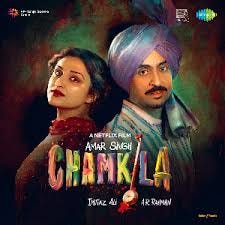As I sat down to write this—write something, after a long time, I was interrupted by work messages. It is International Labor’s day. A holiday. Kind of set the tone for my review, because inspiration also comes when you are angry, no? Work is challenging right now.
And I cannot complain, because it is harder for so many other people out there, especially those who are engaged in physical work, thankless labor - building something for someone’s enjoyment. This type of labor drains your spirit, crushes your body, and stifles your desires. It extinguishes the ability for intellectual or philosophical pursuits.
And then there are other social systems - hand in hand - to bind you, to show you your place based on your family, your gender, your caste. And adding to that are our personal struggles from our uniquely dysfunctional families. We are all messed up - as my friend says.
So are we really surprised that Chamkila's shows were thronged by hundreds of such men (and women from their terraces). We all crave for this entertainment. We all want an expression for our raw desires, a means to express our urge for rebellion, to defy social norms and challenge propriety.
We may not want to admit it, and glorify the rules that we actually hate, just as Chamkila says when he bids an untimely farewell to his fans - “tum sabhi saaf sahi.. Hoon mat maila mein. Tum sabhi paak magar.. Paap ka darya mein” (you all are sincere and pure, I am the only one who is tainted. You all are holy, I am the one who is the torrent of sin).
Chamkila’s songs were outrageously blunt. Hilarious also. Vulgar? Yes - as the standard definition goes.
Objectionable? Objectifying? Here comes the real question. I have not done a dissection of the songs to be able to answer it in a yes or no - especially when there is so much gray area in this entire debate. What I can say from watching the film (and doing a bit of reading later) is that his songs were always duets, in a way that the woman was not the object, but the subject of his story. She likes the man’s attention. She also has desires, and she is vocal about it.
Perhaps that's why Imtiaz Ali dedicated an entire song to depict women enjoying his lyrics— both in secrecy and openly— offering themselves not as objects to be enjoyed, but as human beings seeking, demanding pleasure.
I am not sure if we can say the same about the current rappers from Punjab, popular as they are. And that is where the difference lies. It is not just about talent - it is also about niyat. Am I making an outright judgment statement now? Maybe yes. But because there is no right and wrong in the world of Chamkila and Imitiaz Ali, I think taking that liberty to express my opinion would be okay.
There was one point in the film though, where I just didn't want to go ahead. It is the part where we discover that Chamkila is already married, and his marriage to Amarjot is built on a lie. It almost felt like the underdog that I was rooting for let me down. The feminist in me rebelled against this, and for all his innocence and talent (and Daljit’s cuteness), it is a permanent blot.
Yet, does not the onus also lie on us, those who bind individuals against their will to these institutions? In an alternate universe, Chamkila's wife would have left him of her own volition. Even if I feel bad that she was unable to do so, can we impose something as sacred as marriage - a lifelong companionship, a commitment to mutually support one another— on two individuals who have no say in the matter? Anyway.
Fun fact: When Amar Singh Chamkila debuted on stage (recall that scene where he was pushed before the audience because the main singer was late), he introduced himself as Sandhila. "Sandhila" means something light or pale in color, quite the opposite of "chamkila" which means shiny. However, he was announced as Chamkila, and the name stuck, along with his fate to write and sing these flashy, blingy songs until he was shot dead.
27 was a cruel age to die, and the world would have forgotten him if not for the film. The point was not just about a glimpse into the numbered yet extraordinary lives of the duo. The point would be (and I truly hope so) a reflection on our collective hypocrisy and cowardice— yearning for something yet not admitting it openly. About letting one person take the blame for simply expressing what was our choice and wish all along.
If the film succeeds in doing that, Chamkila lives on.




Hi, I enjoyed reading your piece.
Beautiful ❤️